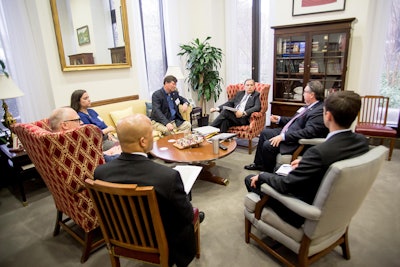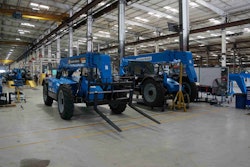![DSC_0749[1]](https://img.equipmentworld.com/files/base/randallreilly/all/image/2017/10/eqw.DSC_07491.png?auto=format%2Ccompress&q=70&w=400)
 In Washington, D.C., members and staff from Equipment Dealers Association and Associated Equipment Distributors met with lawmakers during a 2017 fly-in. Above, Congressman Louis Barletta, R-Pennsylvania, (center) talks with dealers including Ivan Dorhout (right) of Town & Country Implement in Iowa. Dorhout serves on EDA’s board of directors.
In Washington, D.C., members and staff from Equipment Dealers Association and Associated Equipment Distributors met with lawmakers during a 2017 fly-in. Above, Congressman Louis Barletta, R-Pennsylvania, (center) talks with dealers including Ivan Dorhout (right) of Town & Country Implement in Iowa. Dorhout serves on EDA’s board of directors.
Equipment Dealers Association (EDA) says a new plan for overhauling the U.S. tax code could benefit dealers and their customers in a big way. But they’re also worried dealers could be hit hard as tax writers hunt for revenues to pay for reduced tax rates and other reform proposals.
The FY18 tax reform plan proposes a number of provisions for which EDA has been lobbying – including full repeal of the estate tax and a new 25-percent tax rate for pass-through entities, such as partnerships and sole proprietorships, the association says.
“We are pleased to see that the reform plan released by the ‘Big 6’ is consistent with EDA’s tax reform priorities,” says EDA President and CEO Kim Rominger, referring to the group of representatives from the White House, Senate Finance Committee and Congressional Ways and Means Committee.
“Lowering the tax rate for pass-through entities and eliminating the estate tax will have a profound impact on our dealers as well as their customers.”
At risk: LIFO and interest deductibility
With the benefits come caveats for U.S. equipment dealers.
“Concern is heightening over whether LIFO and now, interest deductibility, could be used as ‘pay-fors,’” says Natalie Higgins, EDA’s vice president of government relations and general counsel.
For months, there’s been fear of a proposed retroactive repeal of LIFO – “last in, first out.” That’s an accounting method that operates under the assumption that the last item of inventory bought is the first sold.
“We have heard from multiple sources that LIFO repeal and the elimination of interest deductibility are being considered by the Ways and Means Committee as a ‘pay for’ in the tax reform process,” says Higgins.
“For many of our dealers, the retroactive repeal of LIFO would be extremely detrimental to their businesses. After all, many dealers have been using LIFO for decades and have substantial LIFO reserves accumulated.”
And now, there’s growing worry over whether interest deductions could be disallowed or capped, Higgins tells Equipment World.
“Dealers and farmers could easily wind up paying more taxes on an annual basis – even presuming a lower corporate tax rate – if interest deductibility is eliminated,” she says. “…If they can no longer deduct that interest, it’s going to absolutely cripple the already struggling ag economy.”
Members of Associated Equipment Distributors raised the same concerns in Washington, D.C., on October 23 and 24 while meeting with the Trump Administration and leading lawmakers.
Discussions primarily focused on AED’s tax policy priorities, including protecting the business interest deduction, LIFO and like-kind exchanges, as well as repealing the estate tax and ensuring corporate and pass-through reform proceeds simultaneously so both large and small businesses benefit from improvements to the code and reduced rates.
The need for long-term solvency of the Highway Trust Fund was also stressed by members of AED’s board of directors.
Call to action imminent
EDA is excited about the components that would repeal the death tax and lower the corporate tax rate, Higgins says, “but dealers need to be aware that it’s not all sunshine and rainbows.” They should call their congressional representatives, she advises, because Capitol Hill will be looking for ways to pay for that lower corporate tax rate.
“We don’t want it to wind up being a net loss for them as opposed to a net win,” she says.
Higgins says she’ll issue a call to action in the next day or two outlining concerns about LIFO and interest deductibility, as well as a couple of other topics that EDA is urging dealers to call their congressional representatives and senators to discuss.
The St. Louis, Missouri-based nonprofit trade group represents about 4,500 dealerships in North America.
First overhaul of U.S. tax code in 30 years
Called the Congressional Tax Reform Framework, the plan is intended to provide a template for tax-writing committees developing legislation to improve efficiency, effectiveness and fairness of tax laws.
On October 26, the House of Representatives narrowly passed the FY18 budget resolution, paving the way toward tax reform legislation and President Donald Trump’s tax reform package.
House Republicans provided “the legislative runway for pro-growth tax reform,” according to Ways and Means House Chairman Kevin Brady (R-TX) in a statement just after the 216-212 vote.
“Our successful vote will allow us to move forward quickly on delivering the first overhaul of America’s tax code in more than three decades,” Brady says.
The long-awaited House Republican tax reform bill will be unveiled November 1, providing the public with its first look at the House bill. The Ways and Means Committee will begin working on the measure November 6.
“EDA will continue to work in the coming months to ensure that members of Congress in both parties vote to advance pro-growth tax reform that supports rural economies and small businesses,” Rominger says.
EDA encouraged by Canadian tax reform developments but concerns remain
The EDA is urging Canadian dealers to act now to ensure continued consideration of the needs of businesses during the tax reform process.
In July, Finance Minister Bill Morneau announced the launch of a consultation for proposed tax “updates” for private corporations.
In late October, the Equipment Dealers Association welcomed the government’s plans to revise its initial proposal by reducing the small-business tax rate – a result of comments and concerns expressed through consultations.
“It is always more productive when government and business work together,” Rominger says. “We can only hope the government will listen as we provide advice on those areas where more remains to be done.
“We must work to ensure that equipment dealers and their customers have a seat at the table during these discussions. This is a positive first step, but we expect more and we will be vigilant on the next steps.”
 On Capitol Hill, members and staff from Equipment Dealers Association and Associated Equipment Distributors convey their concerns to lawmakers. Above, Mike Linton of Heritage Agriculture in Arkansas, (second from right) talks with Sen. John Boozman, R-Arkansas, during an April 2017 fly-in.
On Capitol Hill, members and staff from Equipment Dealers Association and Associated Equipment Distributors convey their concerns to lawmakers. Above, Mike Linton of Heritage Agriculture in Arkansas, (second from right) talks with Sen. John Boozman, R-Arkansas, during an April 2017 fly-in.










